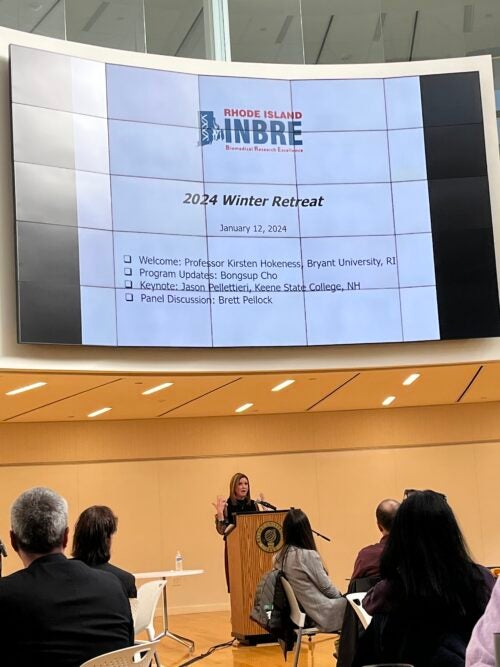 RI-INBRE Winter Retreat
RI-INBRE Winter Retreat
The 2024 RI-INBRE Winter Retreat took place on Friday, January 12, 2024, at Bryant University
Quinlan/Brown Academic Innovation Center. The retreat, began with a meeting of the External Advisory Committee members, the Steering Committee members, the RI-INBRE Program Director, and the RI-INBRE Program Coordinator. In addition, the RI-INBRE Business Manager held a RI-INBRE Grant Administrators meeting.
The morning participants were joined in the afternoon by RI-INBRE investigators (past and present), SURF mentors, RI-INBRE staff, and a select few of Bryant University students. To kick off the 2024 Winter Retreat, Dr. Kirsten Hokeness (Professor & Chair of Department of Biological and Biomedical Sciences at Bryant University) delivered the welcome speech. Following the welcome speech, Dr. Bongsup Cho, RI-INBRE Program Director, updated the participants on the status of the RI-INBRE 2024 grant renewal along with important program updates.
Guest speaker, Dr. Jason Pellettieri (Professor & Chair, Department of Biology, Keene State College, and RI-INBRE Outside Mentoring Consultant) presented “A Planarian Model of Acute Porphyrias – Teaching Through Research at a Small Liberal Arts College”. Dr. Pellettieri believes that “by integrating original research projects into classes and putting undergraduates in charge of the federally funded lines of investigation in our lab, we are deliberately blurring the distinction between student learning and professional scientific inquiry. We reject the pervasive notion that taking such a student-centered approach must come at the expense of doing the kind of high-impact science more commonly associated with labs at doctoral institutions. In addition to incorporating planarian research projects into upper-level science classes like Developmental Biology, we have exploited the dramatic and easily observable regenerative response to engage non-science majors in original, discovery-based research. Students in the general education course Stem Cells and Regeneration conduct science fair-style experiments examining the effects of environmental variables on regeneration to learn about the scientific method.”
“by integrating original research projects into classes and putting undergraduates in charge of the federally funded lines of investigation in our lab, we are deliberately blurring the distinction between student learning and professional scientific inquiry. We reject the pervasive notion that taking such a student-centered approach must come at the expense of doing the kind of high-impact science more commonly associated with labs at doctoral institutions. In addition to incorporating planarian research projects into upper-level science classes like Developmental Biology, we have exploited the dramatic and easily observable regenerative response to engage non-science majors in original, discovery-based research. Students in the general education course Stem Cells and Regeneration conduct science fair-style experiments examining the effects of environmental variables on regeneration to learn about the scientific method.”
The presentation was followed by a panel discussion that was moderated by Dr. Brett Pellock, RI-INBRE Program Coordinator, with a panel discussion with three successful investigators from Primarily Undergraduate Institutions (PUIs) in New England: Dr. Jason Pellettieri (KSC), Dr. Jamie Towle-Weicksel (RIC), and Dr. Seann Mulcahy (PC). All three of the panelists are familiar with INBRE programs and have successfully obtained extramural funding for their research programs and have broad experience running sustainable research programs at their respective PUIs.
The panel discussed their experiences establishing their labs, recruiting and training students, and building a lab culture. The conversation then shifted to the task of balancing student training with research productivity. Of particular interest was advice on recognizing a publishable unit, generating preliminary data for grant applications, and planning for and writing extramural grants. The panel also discussed strategies for developing and sustaining a research culture at PUIs, including steps investigators can take to effectively communicate the importance of institutional support for research as a critical component of PUI research. Panelists also shared their insights into the difficult task of trying to maintain a healthy work-life balance.
